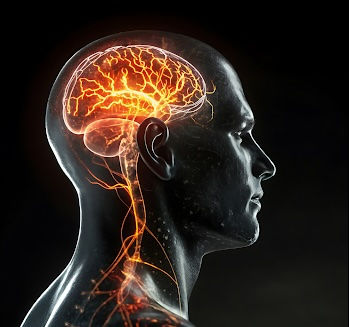Autonomic Dysfunction in hEDS
- Marcia Cristiane Perretto

- Jul 15, 2020
- 3 min read
Updated: Jun 29, 2025

The autonomic nervous system is one of the most important in your body. It controls functions such heart rate, blood pressure, respiration, digestion, metabolism, water and electrolyte balance, urination, and the production of fluids. This body function is important as it does things for you that are involuntary, such as breathing, beating your heart, and digesting food. Autonomic dysfunction is common for those with hypermobile Ehlers Danlos, and can often contribute to a worse quality of life if not treated correctly.
Those with hEDS/EDS typically show signs of autonomic dysfunction during teen years, and include symptoms such as increased heart rate, POTS (postural orthostatic tachycardia syndrome), low blood pressure, digestive problems, disturbed bladder function, sweating problems, and even pre-syncope and syncope. Let’s take a look at the connections between hEDS/EDS and autonomic issues!
The causes of autonomic dysfunction in EDS/hEDS is not fully understood — as with many things regarding ESD. But doctors have been able to suggest that low blood pressure, blood pooling in the legs and gut, low blood circulation, and medications all have side effects that can exacerbate the symptoms of autonomic dysfunction.
Research has found that those with hEDS/EDS tend to have blood vessels that are able to stretch much more than those with normal connective tissue. These loose blood vessels and veins make it more difficult for the body to regulate blood pressure and prevent blood pooling. Drinking extra amounts of water to increase blood volume and increasing your salt intake will also help bring up your blood volume.
Autonomic dysfunction also contributes to metal fog, headache, nausea, and fatigue. At Vanderbilt University‘s Autonomic Dysfunction Clinic, approximately 85% of patients reported cognitive dysfunction, explaining it as: “difficulty thinking, concentrating, pasting attention, trouble remembering things, cloudy or fuzzy feeling in the head, and having problems finding the right words. Researchers have found a few explanations for why those with autonomic dysfunction experience brain fog, but the most commonly accepted method is that there is a reduction in brain blood flow in POTS patients due to blood pooling and lax blood vessels.
Autonomic dysfunction also corresponds weigh an array of gastrointestinal manifestations including esophageal dysmotility such as gastroparesis, small bowel bacterial overgrowth in the upper tract, diarrhea, fecal incontinence, and constipation. GI autonomic dysfunction is important to be aware of as it can lead to malnutrition and worsened digestive problems.
All of this information may seem intimidating and quite frankly frightening! But we are here to give you some solace, since all of these symptoms/manifestations are able to be treated systematically and often without medical intervention! Below are some of our tried and true tips for autonomic dysfunction!
Drink at least 2 liters of water a day! Increasing your blood volume is important if you have POTS or dysautonomia symptoms. Increasing your blood volume is helpful since it allows your body to pump blood through the veins at a more conducive rate, in turn helping you not feel dizzy or brain foggy.
Salt intake is key! Salt (sodium chloride) pushes water out of the cell wall, allowing for there to be a higher concentration of water in your veins, aiding with blood flow.
For those who struggle with brain fog, drinking a hefty amount of electrolytes can help with your cognitive function in addition to cutting out caffeine, alcohol and nicotine. But in the cases where natural remedies don’t work, your doctor might suggest a stimulant to help such as Adderall or Ritalin.
In GI manifestations, it is common for patients to experience slow digestion. Eating foods that are slow in fat and fiber, eating 5/6 small nutritious meals a day instead of 2/3, chewing food thoroughly, and eating well cooked foods can all help with gastroparesis symptoms. In addition, water intake helps greatly with digestion!
We know that autonomic dysfunction seems like a confusing and difficult condition to manage, but we would like to stress that education is so important to managing your symptoms. The first step is understanding, and the second step is action. Being knowledgeable about your condition/conditions gives you the power to understand and treat yourself in a way that no one else will be able to understand. Remember to listen to your body, do some research, and most importantly, consult your doctor!
Be sure to consult with your primary care physician or other medical professionals in regards to autonomic dysfunction. This text cannot and should not replace advice from the patient's healthcare professionals. Any person who experiences symptoms or feels that something may be wrong should seek individual professional help for evaluation and/or treatment. This information is for guidance only and is not intended to provide professional medical advice.
.png)



Comments